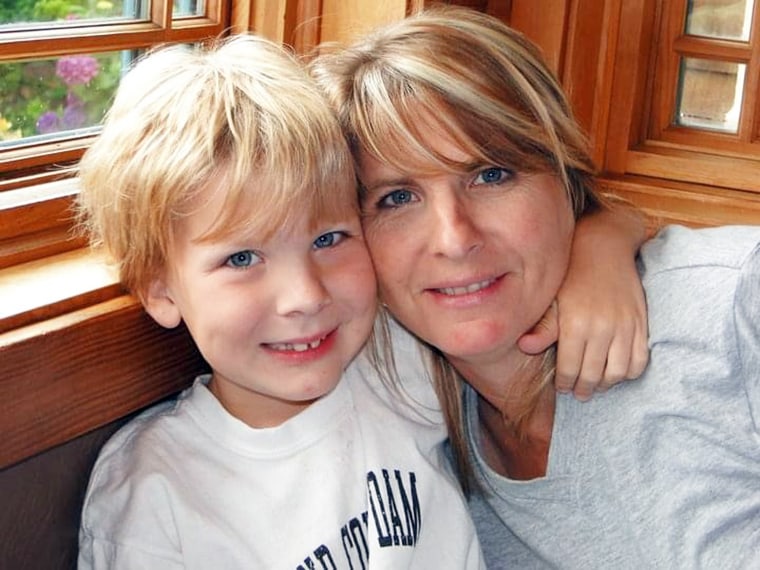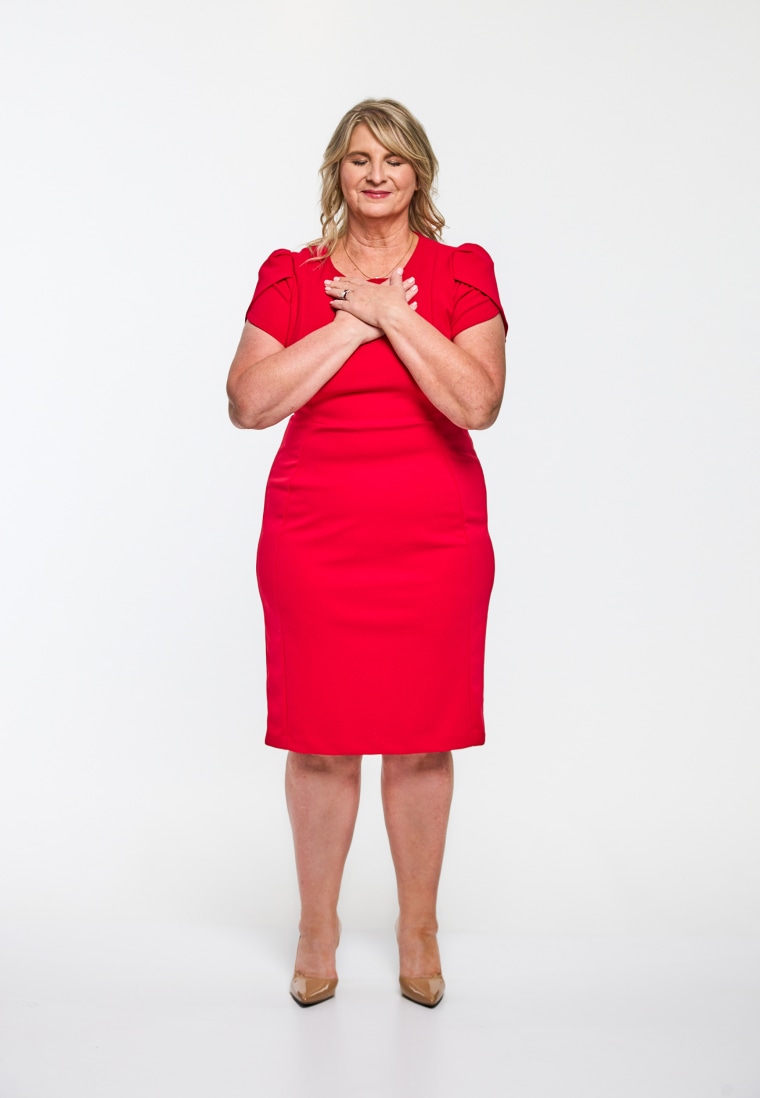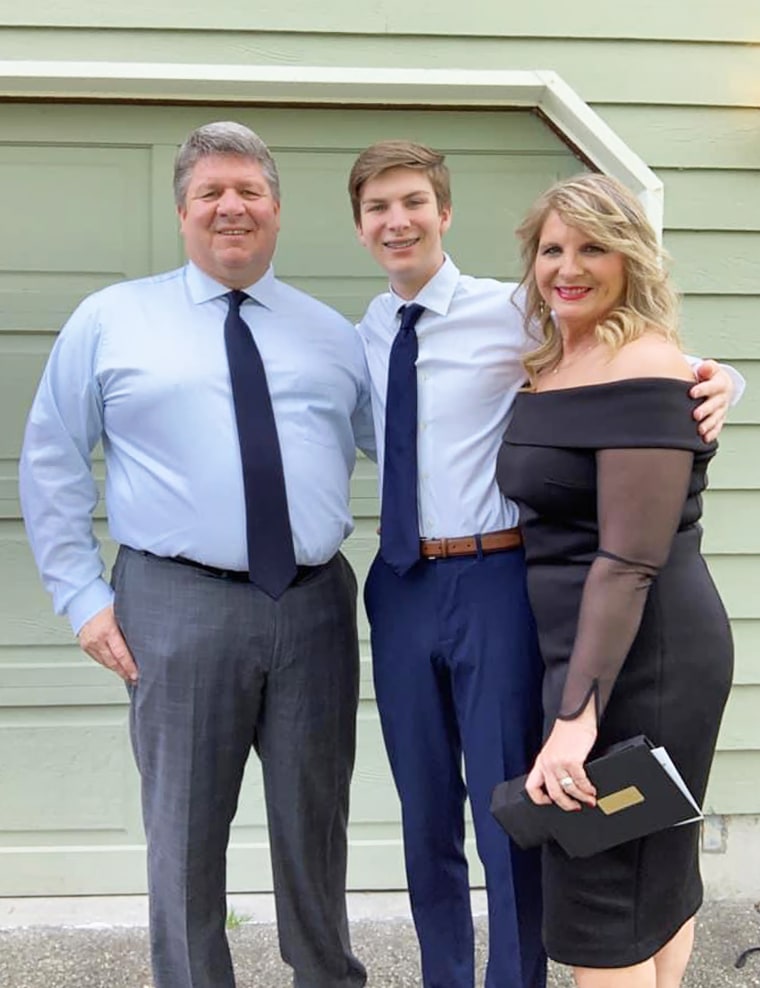Kyra Smithlin still remembers the strange flutter in her heart she felt out of the blue in November 2012 — something she’d never experienced before.
But it was just before the holidays, and she had no prior heart issues or a family history of heart problems, so she put off getting it checked out.
In mid-December of that year, Smithlin was cuddling with her then 9-year-old son Bryce on a Saturday morning when the boy felt her shaking and heard a gasp.
"When I looked over and saw my mom gasping for air, the first thing that came to my mind was a seizure," Bryce Smithlin said on TODAY in a segment that aired on Feb. 2.
"I was terrified. It didn’t even feel like I was awake, it felt like the worst nightmare I’ve ever had."
He ran to get his dad, Tony, who found Smithlin ashen and not breathing.

The then 48-year-old mom had suffered a sudden cardiac arrest, a life-threatening condition where the heart suddenly stops beating, and blood stops flowing to the brain and other vital organs, according to the National Heart, Lung and Blood Institute.
It can happen to a person who may not have been diagnosed with heart disease, the American Heart Association warns.
More than 356,000 Americans suffer a cardiac arrest every year, and 60% to 80% of them die before reaching the hospital, the Centers for Disease Control notes.
Every minute counts to avoid brain and organ injury.
Critical role of CPR
Bryce called 911, while his dad performed CPR — the critical first step in saving Smithlin’s life. More than a decade later, the family is sharing the ordeal to stress the importance of knowing CPR.
At least one member of every family should know the skill, said Smithlin, who is part of the American Heart Association’s Go Red for Women 2024 Class of Survivors.
“I just can’t imagine my husband not having jumped in and starting CPR,” she said on TODAY.
“He’s told me that, ‘I can’t imagine how I would’ve felt if I would’ve just stood by and not done anything.’”

Tony Smithlin performed CPR for about eight minutes.
"Bryce was holding the phone to my head," he recalled on TODAY.
"Just little 9-year-old boy holding the phone while I was doing CPR, the operators making sure I was pacing properly."
He continued until paramedics arrived and delivered four shocks to her heart. They got a faint heartbeat and rushed her to the hospital.
The mom seemed better in the emergency room, but then her condition deteriorated again. Doctors started CPR, then had to shock Kyra Smithlin’s heart 40 times over the next eight hours, burning out batteries in two defibrillators — to the point "where they were not going to continue anymore," she said.
As she lay in a coma on life support, her 9-year-old son stayed next to her all night talking to her, telling her he loved her and begging her to stay. Smithlin credits him for giving her the will to live and getting through to her even though she was unconscious.
"I made it through thanks to Bryce jumping up on my bed. He would talk to me through the whole thing while I was in my coma. He said that he needed me and to 'Fight, mom,'" she recalled.
A few days later, when Smithlin came out of her coma, she motioned that she wanted to write something and scribbled “Bryce is amazing” on a notepad.
"That’s when everyone was like, ‘He was talking to her the whole time, she heard him,'" she said. "So we got it framed and it’s my most favorite treasure I have."
She was well enough to go home almost three weeks later.
'Emotional ride'
Doctors said Smithlin was likely born with non-compaction cardiomyopathy, a very rare congenital disorder of the heart muscle that comes with a high risk of arrhythmia — an abnormal heartbeat, according to the National Library of Medicine.
She described it as "an electrical problem" with her heart.
Smithlin had a defibrillator implanted in her chest to shock her heart into a normal rhythm if needed and was put on medication.
But the ordeal wasn’t over yet. Six months later, she had another sudden cardiac arrest and fainted at home before the defibrillator shocked her heart back to life. The unit has since been upgraded to a device that acts as both a pacemaker and a defibrillator.
“It’s such an emotional ride going through that as a family. There’s a lot of PTSD,” Smithlin said.
“I would come home, and I would be trying to fall asleep at night, and they’d be staring at me, like, is she breathing?”

Therapy has helped with her mental recovery, and Smithlin is grateful she gets to make more memories with her family, including celebrating two of her children’s recent weddings. The family is closer now than before.
“As horrible as it was that that happened, it’s changed my life and my family’s lives in a better way,” she said.
“We are way closer. We hug each other tighter. We always say, ‘I love you.’ I don’t take a day for granted.”
